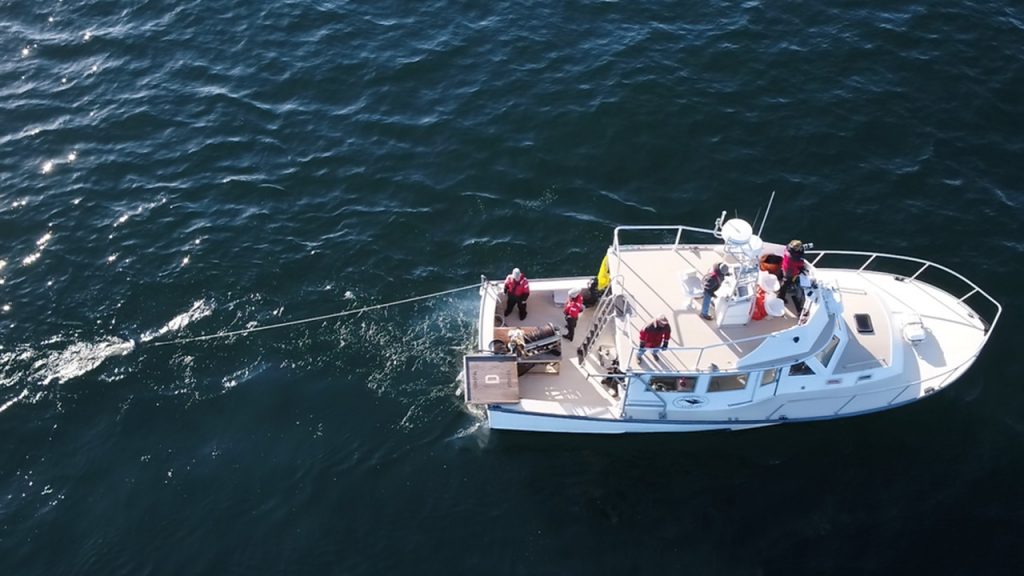Projects
MGEL collaborates with New York State to correlate Acoustic and Visual Survey Data for Cetaceans
The Marine Geospatial Ecology Lab is launching a new project partnering with the New York State Department of Environmental Conservation (NYSDEC). In 2020, the State of New York finished collecting three years of acoustic and visual data on large whales in state waters. MGEL will work on an analysis of this data, correlating the visual …
New and Improved: Mapping Updated Biologically Important Areas for Cetaceans
MGEL has played a large role in the mapping of Biologically Important Areas (BIAs) for cetaceans, a project that aims to expand on previous BIA work. This second iteration, BIA II, has resulted in a series of publications, four of which MGEL has contributed to. In this context, Biologically Important Areas represent areas and times …
New and Improved: Mapping Updated Biologically Important Areas for Cetaceans Read More »
Tethys Stories publishes “WOW! A Collaboration to Study the Impacts of Offshore Wind on Wildlife”
A recent article on Project Wildlife and Offshore Wind (WOW) was written by MGEL staff and published as a Tethys Story. Tethys is a database and online space for the international community of those interested in the environmental effects of wind energy. Tethys Stories are written by individuals working at the intersection of marine systems …
MGEL works to understand how multiple stressors affect North Atlantic right whales in Cape Cod Bay
In a constantly changing ocean, how can we understand how the myriad of threats faced by marine mammals affects their lives? This is the driving question behind Population Consequences of Multiple Stressors (PCoMS), a collaborative working group that aims to understand the impact of multiple stressors on the long-term health of marine mammals. The group …
MGEL takes part in international collaboration for North Atlantic right whale modeling
Though humans need proper documentation to travel back and forth across the Canada/US border, right whales have no such restriction. As the climate changes, North Atlantic right whales (NARW) are shifting their habitat use patterns within US and Canadian waters. As such, understanding where NARW are distributed throughout their habitat range is a critical and …
MGEL takes part in international collaboration for North Atlantic right whale modeling Read More »
Winds of Change: Tracking the Development of US Offshore Wind Energy
Duke University recently hosted “Winds of Change: Tracking the Development of US Offshore Wind Energy,” a one-day symposium to discuss the opportunities and challenges of the offshore wind energy sector. This event was jointly orchestrated by the Nicholas School of the Environment, the Nicholas Institute for Energy, Environment & Sustainability, and the Center for Energy, …
Winds of Change: Tracking the Development of US Offshore Wind Energy Read More »
Meet Debbie Brill: Marine Mammal Subcommittee Coordinator for the Regional Wildlife Science Collaborative for Offshore Wind
Debbie Brill is the marine mammal subcommittee coordinator for the Regional Wildlife Science Collaborative for Offshore Wind (RWSC), which works to coordinate and direct efficient research efforts to support environmentally friendly offshore wind energy development in the U.S. Atlantic. She is a relatively new recruit to MGEL, starting work with the lab in 2021. As …
OBIS-SEAMAP: A New Look and 19 Years
Data, the word, is plural. Everyday English slips into treating the word as a singular, data is, but data are. Understanding the biodiversity of the ocean requires data that are very very plural, the effort of thousands of scientists observing thousands of species. OBIS-SEAMAP plays an important role in centralizing the data we have for …
Our new collaboration for loggerhead conservation
The Marine Geospatial Ecology Lab at Duke University and the University of Exeter, UK are undertaking a collaborative project to support the process of defining marine turtle high use areas, including ways to handle the data that can contribute to answering this question. This pilot effort will focus on loggerhead marine turtles (Caretta caretta) in the Northwest …
Our new collaboration for loggerhead conservation Read More »










